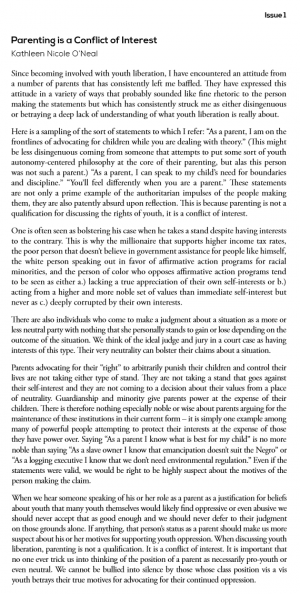One of our staff members is contributing considerably to a News Archiving service at Mu. Any well educated (Masters, PhD or above) users who wish to make comments on news sites, please contact Jim Burton directly rather than using this list, and we can work on maximising view count.
Debate Guide: "As a parent" or "as a survivor"

Arguments from experience are fallacious, indicative of ignorance and attractive to bad faith actors.
"As a parent"/"All good parents"
You clearly have no children. If you did, you would never argue for [POV] because all good parents would know what is in their child's best interest.
It was established many decades ago, by victimologists themselves, that the child's own family is more of a "danger" than the general public. But that is old news from the 90s.
The argument detailed here is a genetic fallacy. Parenthood fails to add to or subtract from the value of the argument. As a thought experiment, we could invoke the phrase "as a pedophile, I believe I can speak with great authority on the needs of your child" to expose the absurdity of debating the merits of pedophiles' opinions on similar issues.
Ultimately, only reasoned, watertight arguments are going to help here. Can your opponent provide them?
No moral monopoly
Also note that hysterical parents do not have a monopoly on deciding what is in "the child's best interest". If they did, the adverse effects of bad policies would mean nothing until a moral-hysteric parent or their child coincidentally became collateral damage.
Parental bias
It may be worth mentioning that parents are often socially biased (a kind of reaction-formation).
"As a survivor"
Look, as a survivor of horrific abuse, I know exactly how harmful sex between adults and minors is. No amount of pedologic handwringing will convince me otherwise!
Being molested (however traumatically) as a child doesn't make your opponent an expert on childhood sexual abuse, pedophilia, or any other topic for that matter. Their assumption is doubly fallacious, as it deploys a false equivalence and then generalizes from unrepresentative anecdotal evidence. As we already know, CSA is empirically invalid, so individuals with unrepresentative personal experiences should refrain from generalizing their own experiences to the detriment of others.
They must also be politely asked to define their experience on two grounds (only fair, since they have claimed that it is of relevance to a debate). Was it 1a) classical - forceful rape, or 1b) new rape[1] (harassment, regretted sex, etc), and 2) at what age did it take place? A lot of former teen abuse survivors sadly feel forced into adopting "CSA" as a label for their unwanted experiences, as it is more likely to draw sympathy and deter victim-blaming attitudes. Most of these people will know that what happened to them was not representative of their peers' sexual experiences, and they can sometimes be reasoned with if evidence is presented.
Assuming bad faith against a self-styled "survivor"
This is a thorny issue, and the strategy we deploy might vary according to our personal style. Most of us draw a line when purported abuse survivors start persecuting/misrepresenting other groups (MAPs) who are in no way responsible for the act described, as this hints at ulterior motives. A conservative approach would be not to accuse them of lying outright, but to point to their abusive, bad-faith actions.
Fallacies and cognitive distortions covered
- Ad hominem fallacy, or appeal to authority/nature: Appeal to the tenuous knowledge/authority and good intentions of a parent - either hypothetical or real.
- Anecdotal fallacy and false equivalence in the case of the survivor.
- Cognitive distortion: Emotional reasoning